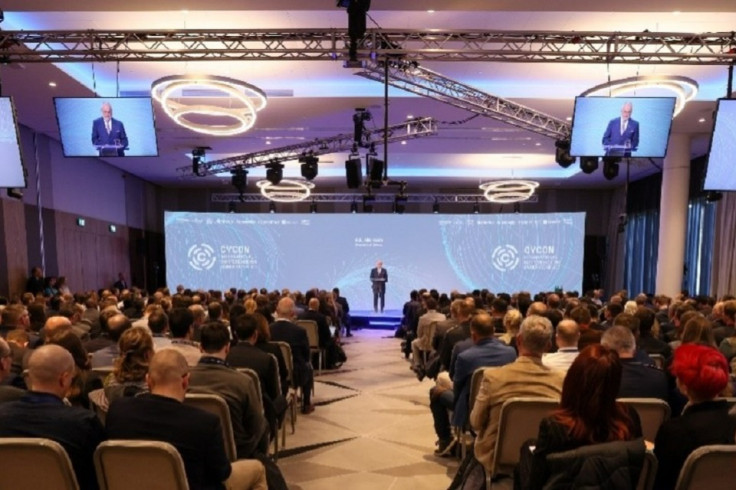Cyber leaders and experts meet in Estonia to address security challenges
The Cyber Commanders' Forum and the Cyber Conference (CyCon) 2023 brought together leaders and experts from across the world to address cybersecurity challenges.

Sovereignty is a central institution of international life which informs the behaviour of nation-states around the world.
Signed back in 1945, Article Two of the Charter of the United Nations clearly establishes "the principle of the sovereign equality" amongst member-states.
Article two of the UN Charter also states that member-states should "refrain in their international relations from the threat or use of force against the territorial integrity or political independence of any state". In other words, the sovereignty of nation-states should be respected.
In orthodox geopolitical terms, this clearly indicates that states should refrain from using conventional forces to interfere with the affairs of a foreign country.
However, a lot has changed since 1945, not least in the domain of technological innovation. Accordingly, one key question is what respect for sovereignty means in the domain of cyberspace.
In today's highly interconnected digital world where "cyberspace has no borders", governments are increasingly concerned with the threats posed by hostile actors. For example, the United States are concerned about the cyber threat posed by China.
A research paper by foreign policy think tank Chatham House highlights that governments have agreed that "principles of sovereignty and non-intervention" apply in the domain of cyberspace. Whilst most cyber attacks may fall "below the threshold of use of force", if they are sufficiently harmful, they can be interpreted under the UN Charter as sufficient to "amount to a use of force" or even an "armed attack" on another nation-state.
In the context of NATO, this implies that a sufficiently harmful cyber attack could be used to invoke Article Five of the North Atlantic Treaty. This point is conveyed in point 25 of the NATO 2022 Strategic Concept. Moreover, the paper also specifies the objective of enhancing "cyber defences, networks and infrastructure".
Given the potential for cyber attacks to assault the sovereignty of nation-states, international cooperation is key amongst nations with shared values and interests to tackle cyber threats.
For example, back in February, British Army cyber experts were instrumental in leading a major cyber war exercise which tested the capabilities of nations from across the world.
However, two more recent international cyber events have occurred in Tallinn, Estonia, bringing together Cyber and electromagnetic domain experts and leaders to tackle common challenges. They were the Cyber Commanders' Forum and the Cyber Conference (CyCon) 2023, with the latter taking place from the 30th of May to the 2nd of June.
General Jim Hockenhull, Commander of Strategic Command, represented Britain at these events. In his words, cyberspace "is a vital domain where global events are shaped - including the conflict resulting from Russia's illegal invasion of Ukraine".
He also highlighted the importance of cooperation amongst allies, but also with industry partners and academia. Crucially, cooperation amongst state and non-state actors is key "to protect our nations, defeat and deter our adversaries".
The Cyber Commanders' Forum involved over 30 nations and was hosted by the Estonian Defence Forces Cyber Command. On the agenda were topics including cyber education, training, and artificial intelligence.
CyCon 2023 brought together more than 600 cyber experts from just under 50 countries. The conference focused on the benefits and opportunities derived from new technologies as well as the threats they present.
More specifically, the purpose of the conference was to bring together leaders and experts to consider how different factors are changing the characteristics of cyber conflicts. For example, emerging technologies such as artificial intelligence and quantum computing, "ongoing conflicts", and "evolving legislation".
Responsible for organising CyCon 2023 was the NATO Cooperative Cyber Defence Centre of Excellence (CCDCOE). CCDCOE is accredited by NATO and operates as a think tank and training institution in technology, strategy, operations and law.
Mart Noorma, CCDCOE director, has highlighted the role CyCon plays in bringing together different actors from the "the public and private sectors, military organizations, and academia" to address cyber security issues as a "unified team".
The CyCon 2023 event benefited from the insights of an impressive range of speakers. They included David van Weel, the NATO Assistant Secretary-General for Emerging Security Challenges, as well as Kemba Eneas Walden, the Acting National Cyber Director for the White House.
CyCon 2023 also involved experts from universities including Cambridge, Cornell, and Oxford, as well as partners from leading companies such as Microsoft, Fortinet, and Palo Alto Networks.
For example, Ross J. Anderson, Professor of Security Engineering at the University of Cambridge and the University of Edinburgh, spoke on what the future holds for cybersecurity.
© Copyright IBTimes 2025. All rights reserved.




















